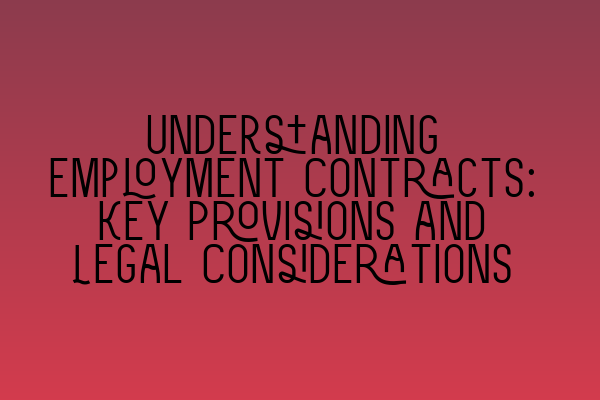Understanding Employment Contracts: Key Provisions and Legal Considerations
As a solicitor practicing contract law, one area that requires careful attention is employment contracts. For both employers and employees, understanding the key provisions and legal considerations of employment contracts is crucial. In this blog post, we will explore the essential elements of employment contracts and discuss the legal aspects that both parties should be aware of.
1. Offer and Acceptance
Employment contracts, like any other contracts, begin with an offer made by the employer and an acceptance by the employee. This initial step sets the foundation for the contractual relationship. It is important to clearly outline the terms and conditions of employment in the offer, and for the employee to thoroughly review and accept those terms before starting work. By ensuring a clear offer and acceptance, both parties can avoid potential disputes in the future.
2. Job Title and Description
The job title and description are essential elements of an employment contract. These provisions define the roles, responsibilities, and expectations of the employee. Clear and comprehensive job descriptions help manage employee performance and provide a basis for assessing job-related duties and obligations. It is crucial for employers to accurately describe the position and delineate any specific requirements or qualifications needed.
3. Hours of Work and Remuneration
The contract should specify the number of hours the employee is expected to work and the remuneration they will receive. It is important to clarify any overtime arrangements, including rates and conditions. Additionally, the contract should outline the frequency and method of payment, ensuring compliance with relevant employment laws and regulations. Employers should also consider provisions for any available employee benefits such as health insurance, retirement plans, or performance-based bonuses.
4. Probationary Period
Many employment contracts include a probationary period to evaluate an employee’s suitability for a particular role. During this period, both parties can assess whether the employee meets the desired standards and whether the position is a good fit. The contract should clearly state the duration of the probationary period and any conditions or assessments that will apply. Employers should comply with applicable legislation, ensuring that the probationary period does not exceed legal limits and providing necessary guidance and support for employee development.
5. Termination and Notice Period
Termination clauses are essential provisions in employment contracts. They outline the circumstances under which the employment relationship may be terminated and the notice period required by either party. The notice period gives both the employer and the employee an opportunity to make arrangements for the termination and seek alternative employment or a replacement. It is crucial to comply with statutory notice requirements and ensure termination clauses align with relevant employment laws.
6. Confidentiality and Non-Compete
Employment contracts often include provisions relating to confidentiality and non-compete agreements. Confidentiality clauses protect sensitive and proprietary information of the employer, while non-compete clauses restrict employees from engaging in activities that may compete with the employer’s business. These provisions should be reasonable in scope, time, and geographical restrictions, and should be carefully drafted to avoid any potential unenforceability. Employers must also be mindful of compliance with competition laws and any specific restrictions applicable in their jurisdiction.
7. Dispute Resolution and Governing Law
Employment contracts should include provisions for dispute resolution and a choice of governing law. In the event of a disagreement or breach of contract, it is important to have a mechanism in place to address and resolve the dispute. Employers and employees can agree on methods such as mediation or arbitration to avoid lengthy and costly litigation. Additionally, specifying the governing law helps determine the legal framework within which any potential disputes will be resolved.
Understanding the key provisions and legal considerations of employment contracts is essential for both employers and employees. By clearly outlining the terms and conditions of employment, both parties can mitigate potential disputes and ensure a smooth working relationship. If you require assistance in drafting or reviewing employment contracts, SQE Contract Law is here to support you. Contact us today to discuss your needs and learn more about our services.
Related Articles:
SQE 1 Practice Exam Questions
SQE 1 Practice Mocks FLK1 FLK2
SQE 2 Preparation Courses
SQE 1 Preparation Courses
SRA SQE Exam Dates
